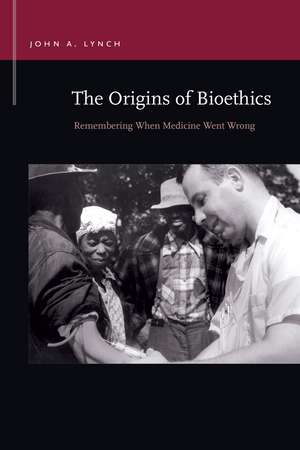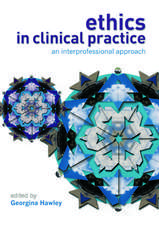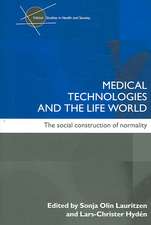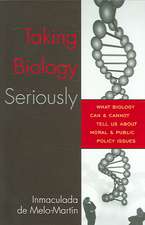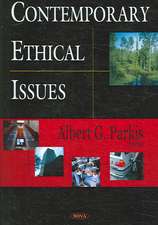The Origins of Bioethics: Remembering When Medicine Went Wrong: Rhetoric & Public Affairs
Autor John A. Lynchen Limba Engleză Paperback – 31 aug 2019
The Origins of Bioethics argues that what we remember from the history of medicine and how we remember it are consequential for the identities of doctors, researchers, and patients in the present day. Remembering when medicine went wrong calls people to account for the injustices inflicted on vulnerable communities across the twentieth century in the name of medicine, but the very groups empowered to create memorials to these events often have a vested interest in minimizing their culpability for them. Sometimes these groups bury this past and forget events when medical research harmed those it was supposed to help. The call to bioethical memory then conflicts with a desire for “minimal remembrance” on the part of institutions and governments. The Origins of Bioethics charts this tension between bioethical memory and minimal remembrance across three cases—the Tuskegee Syphilis Study, the Willowbrook Hepatitis Study, and the Cincinnati Whole Body Radiation Study—that highlight the shift from robust bioethical memory to minimal remembrance to forgetting.
Din seria Rhetoric & Public Affairs
-
 Preț: 341.01 lei
Preț: 341.01 lei -
 Preț: 259.44 lei
Preț: 259.44 lei -
 Preț: 408.40 lei
Preț: 408.40 lei -
 Preț: 300.53 lei
Preț: 300.53 lei -
 Preț: 277.68 lei
Preț: 277.68 lei -
 Preț: 171.63 lei
Preț: 171.63 lei -
 Preț: 169.14 lei
Preț: 169.14 lei -
 Preț: 221.28 lei
Preț: 221.28 lei - 13%
 Preț: 344.48 lei
Preț: 344.48 lei -
 Preț: 180.86 lei
Preț: 180.86 lei -
 Preț: 164.31 lei
Preț: 164.31 lei - 13%
 Preț: 330.65 lei
Preț: 330.65 lei -
 Preț: 151.17 lei
Preț: 151.17 lei -
 Preț: 305.81 lei
Preț: 305.81 lei -
 Preț: 154.36 lei
Preț: 154.36 lei - 13%
 Preț: 410.06 lei
Preț: 410.06 lei -
 Preț: 123.73 lei
Preț: 123.73 lei -
 Preț: 332.55 lei
Preț: 332.55 lei -
 Preț: 127.81 lei
Preț: 127.81 lei - 13%
 Preț: 442.80 lei
Preț: 442.80 lei -
 Preț: 362.72 lei
Preț: 362.72 lei - 13%
 Preț: 344.56 lei
Preț: 344.56 lei - 13%
 Preț: 331.96 lei
Preț: 331.96 lei - 13%
 Preț: 330.72 lei
Preț: 330.72 lei - 13%
 Preț: 331.55 lei
Preț: 331.55 lei - 13%
 Preț: 334.52 lei
Preț: 334.52 lei - 13%
 Preț: 331.55 lei
Preț: 331.55 lei - 13%
 Preț: 380.96 lei
Preț: 380.96 lei -
 Preț: 262.76 lei
Preț: 262.76 lei -
 Preț: 270.62 lei
Preț: 270.62 lei - 13%
 Preț: 331.14 lei
Preț: 331.14 lei -
 Preț: 248.30 lei
Preț: 248.30 lei -
 Preț: 208.43 lei
Preț: 208.43 lei - 13%
 Preț: 332.20 lei
Preț: 332.20 lei -

Preț: 148.00 lei
Preț vechi: 155.79 lei
-5% Nou
Puncte Express: 222
Preț estimativ în valută:
28.32€ • 29.46$ • 23.38£
28.32€ • 29.46$ • 23.38£
Carte tipărită la comandă
Livrare economică 15-29 aprilie
Preluare comenzi: 021 569.72.76
Specificații
ISBN-13: 9781611863413
ISBN-10: 1611863414
Pagini: 246
Ilustrații: 9
Dimensiuni: 152 x 229 x 18 mm
Greutate: 0.34 kg
Ediția:1
Editura: Michigan State University Press
Colecția Michigan State University Press
Seria Rhetoric & Public Affairs
ISBN-10: 1611863414
Pagini: 246
Ilustrații: 9
Dimensiuni: 152 x 229 x 18 mm
Greutate: 0.34 kg
Ediția:1
Editura: Michigan State University Press
Colecția Michigan State University Press
Seria Rhetoric & Public Affairs
Recenzii
"This is a remarkable and engaging book. John A. Lynch is a master at using scholarship in communication and rhetoric to shine a light on bioethics topics and issues. This book is a perfect demonstration of that strategy. Written in clear and engaging prose, it invites readers to reflect on the conflicting interests that continue to shape how stories of research misconduct are told and memorialized. Bioethicists will especially appreciate Lynch’s invitation to reexamine the role bioethicists play in keeping these stories alive in public memory."
—Kyle Brothers, Endowed Chair in Pediatric Clinical and Translational Research, University of Louisville School of Medicine
—Kyle Brothers, Endowed Chair in Pediatric Clinical and Translational Research, University of Louisville School of Medicine
"Working across apparently disparate terrain of medical rhetoric and rhetorical studies of memory places, John A. Lynch makes a powerful argument that memory undergirds contemporary public debates about bioethics. Lynch carefully theorizes public feelings like disgust, anger, and the uncanny while tracing useful distinctions between minimal memory and forgetting. The heart of the book is his compelling critical assessments of memory practices regarding moments when “'medicine went wrong.'”
—Greg Dickinson, Professor and Chair, Department of Communication Studies, Colorado State University, and author of Suburban Dreams: Imagining and Building the Good Life
—Greg Dickinson, Professor and Chair, Department of Communication Studies, Colorado State University, and author of Suburban Dreams: Imagining and Building the Good Life
"The Origins of Bioethics offers original contributions to both humanistic studies of medical science and interdisciplinary studies of public memory—an impressive scholarly feat indeed. The author’s depth of research, dexterous analyses, and learned insights ensure that this book will appeal to a variety of readers both within rhetorical studies and across related disciplines."
—Bradford Vivian, Professor of Communication Arts and Sciences, Pennsylvania State University, and author of Commonplace Witnessing: Rhetorical Invention, Historical Remembrance, and Public Culture
—Bradford Vivian, Professor of Communication Arts and Sciences, Pennsylvania State University, and author of Commonplace Witnessing: Rhetorical Invention, Historical Remembrance, and Public Culture
Notă biografică
John A. Lynch is Professor and Graduate Director in the Department of Communication at the University of Cincinnati. He was previously the clinical research ethicist at the Center for Clinical and Translational Science and Training at UC’s College of Medicine. He is the author of What Are Stem Cells? Definitions at the Intersection of Science and Politics, which received the 2016 Distinguished Book Award from the National Communication Association’s Health Communication Division, and “‘Prepare to Believe’: The Creation Museum as Embodied Conversion Narrative,” which received the Association for the Rhetoric of Science, Technology, and Medicine’s 2014 Article of the Year Award.
Descriere
The Origins of Bioethics argues that what we remember from the history of medicine and how we remember are consequential for the identities of doctors, researchers, and patients in the present day. Remembering when medicine went wrong calls people to account for the injustices inflicted on vulnerable communities across the twentieth century in the name of medicine, but sometimes these people bury this past and forget events in attempts to minimize their culpability. The call to bioethical memory then conflicts with a desire for “minimal remembrance” on the part of institutions and governments. The Origins of Bioethics charts this tension between bioethical memory and minimal remembrance across three cases that highlight the shift from robust bioethical memory to minimal remembrance to forgetting.
